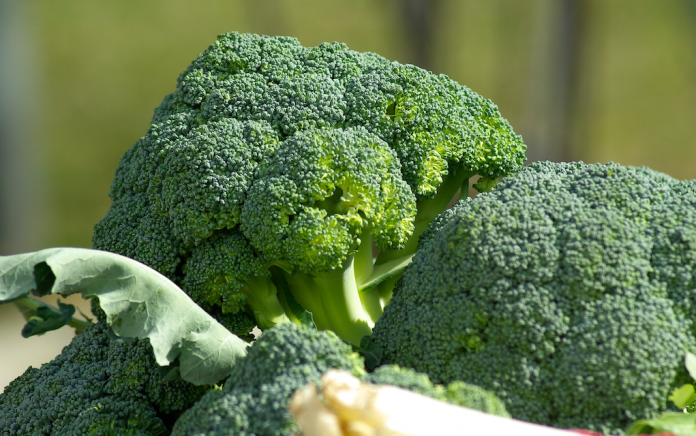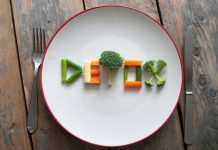
Broccoli has always been one of my top five favorite vegetables, so I’ve never had to come up with reasons to eat broccoli more often than I already do. However, I realize not everyone is on that dietary path, but you could be! So I’d like to introduce some exciting info and tips about this versatile vegetable. Be prepared to learn its nutritional value and how to cook it, with links to simple broccoli recipes and more!
Nutritional value of broccoli
Did you know there is such a thing as broccoli protein? Yes! In fact, you get 7 percent of your daily requirement for protein in just one cup of this cooked veggie. Along with the protein you also get the following percentages of your daily needs of these nutrients:
- 245% vitamin K
- 135% vitamin C
- 53% chromium
- 42% folate
- 19% vitamin B5
- 18% vitamin B6 and fiber
- 15% phosphorus, choline, and vitamins B2 and E
- 13% manganese and vitamin A
- 11% copper
- 10% potassium

Read about a simple broccoli stir fry recipe
Reasons to eat broccoli
In addition to the powerhouse of nutrients you get from broccoli, the tree-like cruciferous vegetable also has phytonutrients associated with other broccoli benefits. For example:
May fight cancer. Broccoli contains sulforaphane, a sulfur-compound that has been shown to interfere with an enzyme that can stop cancer cells from progressing. Scientists have shown that sulforaphane has an ability to delay or slow numerous types of cancer, including bladder, breast, colon, liver, lung, prostate, and stomach.
Broccoli contains a good amount of folate, a vitamin that has been found to reduce the risk of breast cancer in women. Folate may also prove effective in fighting cervical, colon, pancreatic, and stomach cancers.
Improves bone health. Remember the high amount of vitamin K in broccoli? This nutrient is critical for strong bones because it enhances the absorption of calcium while also reducing the amount of calcium excreted in urine. As an added bonus for bone health, broccoli also provides 43 milligrams of calcium per cup.
Helps fight aging. The excellent amount of vitamin C in broccoli is a boon to promoting and supporting healthy skin by helping protect it against the sun. Vitamin C plays an important role in the production of collagen, which is the main structural element of the skin. This support in turn can help reduce fine lines and wrinkles.
Improves digestion and detox. Bet you never thought of better digestion as one of the reasons to eat broccoli. In fact, it provides a decent amount of fiber, which aids digestion and regularity. Eating enough fiber also helps eliminate toxins via the intestinal tract.

May fight osteoarthritis. It turns out that the sulforaphane in broccoli may do more than help ward off cancer. Some research indicates that the compound may have the potential to block damage caused to cartilage in osteoarthritis.
Supports eye health. We often think of carrots and vitamin A when we think of eye health. However, broccoli is rich in two important phytonutrients, lutein and zeaxanthin. Both of these carotenoids have been associated with improved vision.
Promotes heart health. The fiber in broccoli can help lower cholesterol and blood pressure, two risk factors for heart disease. Overall, fiber intake is associated with significantly lower risks of stroke, coronary heart disease, and the development of obesity. The lutein and folate in broccoli also contribute to a healthier heart.
Read about 6 ways to get more broccoli in your diet
How to cook broccoli
If you want to retain the powerhouse of nutrients in broccoli, keep cooking to a minimum. Here is a quick, easy broccoli recipe.
Steamed Broccoli
Cut broccoli florets and stems into bite-size pieces. Fill the bottom on a steamer pot with 2 inches of water and bring the water to a boil. Add the stems and steam for 1.5 to 2 minutes, then add the florets and steam for an additional 2 to 3 minutes. Remove from heat, put the broccoli into a colander, and rinse with cool water to stop the cooking.
You can use the broccoli in salads, mix with other vegetables, add your favorite sauce or other topping, or include in another recipe.
You can find many excellent simple broccoli recipes on the internet and in cookbooks. Here’s a healthy broccoli recipe to get you motivated.
Broccoli, Kale, and Mushrooms
Serves 4 to 6
- 2 Tb extra virgin olive oil
- 1 lb broccoli, chopped
- 8 cloves garlic, sliced
- 1 bunch kale, chopped
- 1 cup button mushrooms
- Juice of 2 limes
In a large skillet, heat the olive oil. Add the garlic and cook for 2 minutes. Stir in the broccoli and cook for 1 minute. Add the kale and mushrooms and cook for 2 minutes, stirring often. Pour in the lime juice and season with salt and black pepper to taste. Stir well.
The bottom line
You're not a kid any more! The scientific evidence is in and there are too many delicious recipes to ignore. It's time for you (and your kids!) to appreciate all the great reasons to eat broccoli more often.
Read This Next: Broccoli Egg Muffins
Sources
Anderson JW et al. Health benefits of dietary fiber. Nutrition Reviews 2009 Apr; 67(4): 188-205
George Mateljan Foundation. Broccoli. The World’s Healthiest Foods
National Cancer Institute. Cruciferous vegetables and cancer prevention.
Pearson DA. Bone health and osteoporosis: the role of vitamin K and potential antagonism by anticoagulants. Nutrition in Clinical Practice 2007 Oct; 22(5): 517-44
Telang PS. Vitamin C in dermatology. Indian Dermatology Online Journal 2013 Apr-Jun; 4(2): 143-46
Tortorella SM et al. Dietary sulforaphane in cancer chemoprevention: the role of epigenetic regulation and HDAC inhibition. Antioxidants & Redox Signaling 2015 Jun 1; 22(16): 1382-424
Zeng J et al. Folate intake and the risk of breast cancer: an up-to-date meta-analysis of prospective studies. European Journal of Clinical Nutrition 2019 Jan 15










